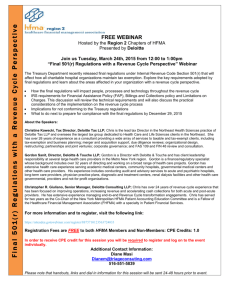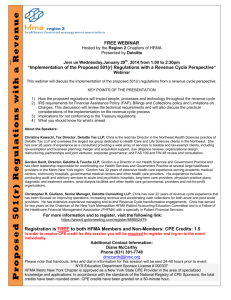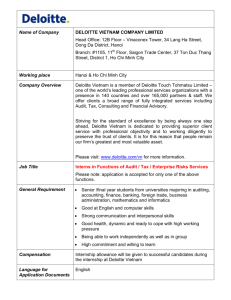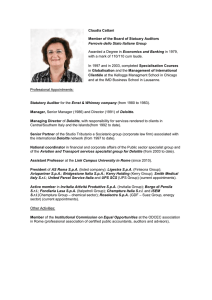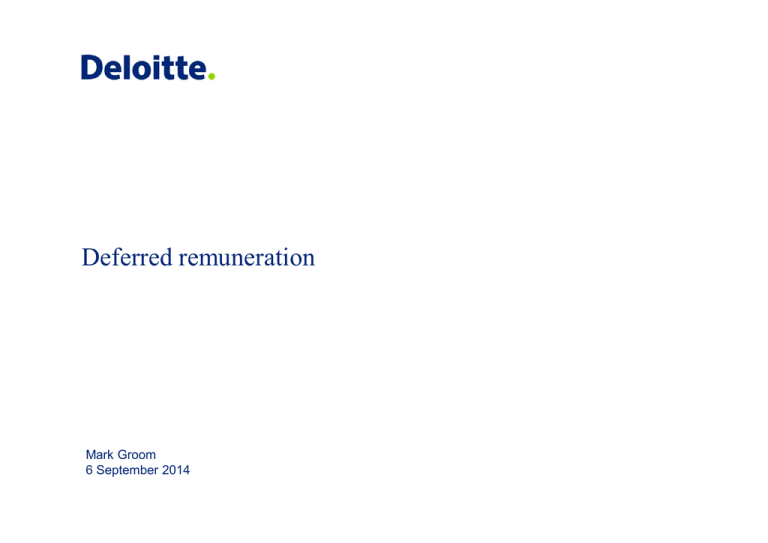
Deferred remuneration
Mark Groom
6 September 2014
© 2014 Deloitte LLP. All rights reserved.
For discussion:
Current trends
Deferred remuneration
Pensions
Challenges
• Domestic
• International
© 2014 Deloitte LLP. All rights reserved.
Current trends
• Longer-term holding and clawback have been a feature of US plans for some
time but recent increase in UK PLCs and expected to continue
• Roots in the financial services industry (FSI) but now extending to other sectors
• For certain FS staff (“code staff”, broadly senior management, control
functions and material risk takers):
‒ 40% - 60% of variable pay must be deferred
‒ Deferral >= 3years; longer timescales recommended where appropriate
‒ >=50% of variable pay delivered in shares or other instruments
• These should be held for a further >=6m post vesting
‒ Capital Requirements Directive IV of the Bank of England requires all elements of
variable pay to be subject to malus/clawback
‒ Prudential Regulation Authority recent consultation on amending employment terms to
allow claw back for up to 6 years post vesting
© 2014 Deloitte LLP. All rights reserved.
Malus and clawback
Malus (“soft clawback”)
• only applicable up to vesting
• forfeiture of unvested property (e.g. cash/shares) rights
Clawback (“hard clawback”)
• recovery of vested property rights (e.g. cash/shares already delivered)
• increasingly associated with other bespoke arrangements, not just deferral e.g.
• Sign on bonuses
• Professional qualifications
• Termination payments
© 2014 Deloitte LLP. All rights reserved.
Prevalence
% of companies using malus/clawback
FTSE 250
FTSE 100
100%
100%
90%
90%
80%
80%
70%
70%
60%
60%
50%
50%
40%
40%
30%
30%
20%
20%
10%
10%
0%
0%
© 2014 Deloitte LLP. All rights reserved.
Application
FTSE 100
FTSE 250
100%
90%
90%
80%
80%
70%
70%
60%
60%
% of companies
100%
50%
40%
50%
40%
30%
30%
20%
20%
10%
10%
0%
Misstatement Misconduct Reputational Failure of risk
damage management
and control
Other
reasons
Performance
not sustained
0%
Misstatement Misconduct Reputational Failure of risk
damage management
and control
Other
reasons
Performance
not sustained
© 2014 Deloitte LLP. All rights reserved.
Challenges
Fairness?
When is remuneration paid/received?
• Should earnings be taxable if subject to a contingency?
• Condition subsequent vs condition precedent
• What about vesting followed by a further holding period?
• If employee can enjoy the benefit of remuneration, why shouldn’t HMRC enjoy
the tax?
• But, in that case, if employee has to repay remuneration (in whole or part), why
shouldn’t proportionate relief be available?
• Should NIC be treated differently?
• Currently only repayable if an error made at the time of payment
© 2014 Deloitte LLP. All rights reserved.
Challenges
Distortive?
Where an employer is a partnership
• Remuneration unpaid to employees within 9m increases partner profits
• Dry tax charge for partners
• Taxable at their highest marginal rate (+NIC)
• Considerably higher than corporation tax payable on corporate deferrals (and
no NIC)
• Complexity with new/retiring partners:
• Outgoing partners
‒ pay more tax in relation to remuneration previously accrued but unpaid
• Incoming partners
‒ reduced tax when remuneration is actually paid
• Currently complex structures needed to mitigate (if possible)
Accept status quo or should future policy address these distortions?
© 2014 Deloitte LLP. All rights reserved.
Challenges
Commercial?
Employee benefit trusts often used to deliver deferral (security)
UK appears to view long term deferral as tax avoidance
Part 7A ITEPA 2003 (“disguised remuneration”)
5 year limit for cash deferral; 10 year limit for share based deferral
Both require realistic prospect of forfeiture for at least the first 12m
Compare with (for example) the US (s409A)
• Deferral possible where elected in advance of a year
• Must be deferred until 6m post separation from service
UK-US differential treatment can create dry tax charges e.g.
• US assignees to the UK could suffer DR charges on deferrals exceeding 5
years, or any deferral not subject to forfeiture for at least 12m
How can tax policy better support commercial/regulatory requirements?
Time for international fiscs to discuss and reconcile differences?
© 2014 Deloitte LLP. All rights reserved.
Challenges
International tax – claw backs
UK
•
•
HMRC position is that no relief is available
Julian Martin v HMRC – decision from appeal awaited
•
Depends on whether events in same tax year
China
•
•
Technically possible to claim repayment of tax
However in practice - time consuming and no guarantee of
success
France
•
•
No precedent or case law
Potentially if same tax year, more difficult if subsequent tax year
Germany
•
•
No precedent and so tax authorities may challenge
Could claim repayment as negative employment income
•
Claim repayment as an expense against other income in year of
claw back (via personal tax return)
Any excess will be lost (no provision to carry forward/ carry back)
US
Japan
•
10
© 2014 Deloitte LLP. All rights reserved.
Pensions
Vs Deferred Remuneration
Broadly speaking:
[Deferred] remuneration (Article 15)
• Taxed in the State in which the employment is exercised
Pensions (Article 18)
• Private pensions taxed in the State in which the individual is resident when paid
• (Public pensions taxed in the State which pays the pension)
What’s wrong with this picture?
• When an individual is employed in one State and retires to another
• Tax on pensions paid contributes to the social/medical/other costs of the State
where an individual retires
• But the State providing the relief where the pension was earned is out of
pocket
© 2014 Deloitte LLP. All rights reserved.
Challenges
Equivocation
What is pension income anyway?
• Traditionally, regular payments payable to death
• Lump sums complicated
• And freedom of access from 2015 (in the UK) arguably erodes the distinction
between pension and deferred remuneration
• Presumably still taxable as a pension?
• Germany taxes a German pension paid to a UK resident if it was earned in
Germany over 15 years or more and the contributions were tax deductible there
• Netherlands/UK: source state may tax >£25k pension income where relief given
on contributions
• Belgium/UK: unconditional switch to source state tax
• Sweden/UK: source state tax (20% dedn) unless a national of residence state
Should States take a holistic view? Where is the public debate on this?
Swings and roundabouts, in particular in the EU (given freedom of movement)?
© 2014 Deloitte LLP. All rights reserved.
Challenges
Temporary non-residence
Say, a UK national works in the UK, retires to Spain
• Paid pension of just over £20K per annum for 5 years
• Returns to the UK just before the expiry of 5 years
• Just over £100K taxed in the UK as if a lump sum paid in year of return under
s394A (if not respected as a pension)
• Penalty tax on…
• Just over £90K (after personal allowance, partly @ 40%) less foreign tax paid
• Compared with just over £50K (with 5 years personal allowances, all @ 20%)
Why the apparent presumption that the emigration to Spain was to avoid tax?
© 2014 Deloitte LLP. All rights reserved.
Challenges
Non-registered schemes
Lump sums
• Post 5 April 2011 rights - Part 7A “disguised remuneration” - earnings basis
• Pre 6 April 2011 rights – s394 (s554W carves out of DR) – by residence/source?
Pensions
• UK residents taxed under Part 9
• Non UK residents taxed under DR (need to look to Treaty)
Subject to terms of Treaty, scope for double taxation - consider e.g.
• UK employee retires to Spain
• Will UK want to tax as remuneration – Article 15?
• Will Spain tax as a pension – Article 18?
• Spanish employee retires to the UK
• Will UK want to tax as a pension – Article 18?
• Will Spain want to tax as remuneration – Article 15?
© 2014 Deloitte LLP. All rights reserved.
Challenges
QROPs
Impact of flexible access in the UK from 2015?
Will transfers out of the UK become easier and more attractive?
The 70/30 rule will have to go.
Historically, policy has been to prevent pension liberation through overseas
transfers.
What does flexible access mean for future policy in this area?
© 2014 Deloitte LLP. All rights reserved.
Challenges
Summary
Deferred remuneration
• Current UK treatment unnecessarily restrictive, distortive and can create dry tax
charges. Draconian approach to claw backs.
• Falling behind commercial and regulatory requirements and not competitive
internationally
• Distinction from pension in domestic tax systems blurred and blurring and not
sufficiently clear in Tax Treaties
Pensions
• Flexible access in the UK from 2015 breaks down the distinction between
pension and remuneration
• The distinction is also important with non-registered schemes because of the
interaction between DR and s394
• Time for OECD countries to reconcile their differences regarding the treatment
of deferred remuneration and pensions
© 2014 Deloitte LLP. All rights reserved.
Deloitte refers to one or more of Deloitte Touche Tohmatsu Limited (“DTTL”), a UK private company limited by guarantee, and its network of
member firms, each of which is a legally separate and independent entity. Please see www.deloitte.co.uk/about for a detailed description of the
legal structure of DTTL and its member firms.
Deloitte LLP is the United Kingdom member firm of DTTL.
This publication has been written in general terms and therefore cannot be relied on to cover specific situations; application of the principles set out
will depend upon the particular circumstances involved and we recommend that you obtain professional advice before acting or refraining from
acting on any of the contents of this publication. Deloitte LLP would be pleased to advise readers on how to apply the principles set out in this
publication to their specific circumstances. Deloitte LLP accepts no duty of care or liability for any loss occasioned to any person acting or refraining
from action as a result of any material in this publication.
Deloitte LLP is a limited liability partnership registered in England and Wales with registered number OC303675 and its registered office at 2 New
Street Square, London EC4A 3BZ, United Kingdom. Tel: +44 (0) 20 7936 3000 Fax: +44 (0) 20 7583 1198.
© 2014 Deloitte LLP. All rights reserved.
© 2014 Deloitte LLP. All rights reserved.


